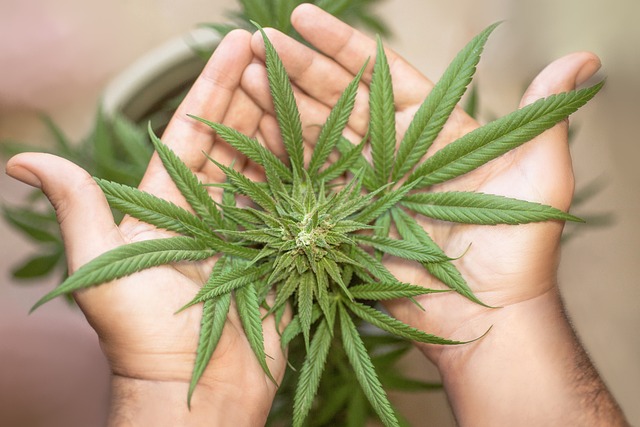In Missouri, as the legal framework for cannabis products expands, understanding THCA (Tetrahydrocannabinolic Acid) is crucial for residents, especially given its non-psychoactive status and therapeutic uses under the state's medical marijuana program, which was established post-Amendment 2 in 2018. THCA, a precursor to THC, is legal within this framework but must be handled with care to avoid decarboxylation into its psychoactive form. Users should adhere strictly to state guidelines and consult healthcare providers before use, as THCA can convert into THC when heated, potentially inducing psychoactive effects. It's important to note that any use of THCA outside the regulated medical marijuana system is illegal, with the Missouri Department of Health and Senior Services overseeing all aspects of cannabis cultivation, processing, and sales to ensure a compliant marketplace. Consumers must stay updated on local laws, as they can vary within the state. For accurate information on THCA flower use and compliance, legal advice or official state resources should be consulted.
Exploring the nuanced effects of THCA flower on health and well-being, this article serves as a guide for Missouri residents navigating its legal consumption. Diving into the potential side effects of THCA flower, we provide clarity on what users might experience, with a focus on its legal status within the state’s evolving regulations. Understanding the distinctions and implications is crucial for those considering THCA flower as part of their wellness routine in Missouri.
- Exploring THCA Flower Side Effects: A Comprehensive Overview for Missouri Residents
- Navigating the Legal Landscape of THCA Flower Consumption in Missouri
Exploring THCA Flower Side Effects: A Comprehensive Overview for Missouri Residents

As Missouri embraces the evolving landscape of cannabis legislation, understanding the implications of THCA (Tetrahydrocannabinolic Acid), a non-psychoactive precursor to THC found in raw cannabis, becomes increasingly pertinent for residents. THCA is legal in Missouri under certain conditions, as outlined by state regulations that allow for the use of low-THC cannabis for therapeutic purposes. While THCA itself does not produce psychoactive effects, it is being recognized for its potential wellness benefits and has gained popularity among users seeking relief from various ailments without the high associated with its decarboxylated form, THC.
Navigating the side effects of THCA flower necessitates careful consideration of individual physiology and dosage. Common side effects may include dizziness, dry mouth, and mild psychoactive effects if the THCA is improperly decarboxylated during handling or consumption. It’s crucial for Missouri residents to adhere to the state’s guidelines regarding possession and use of cannabis products, including those containing THCA. Users should also be aware that while THCA is non-psychoactive in its raw form, heating it can transform it into THC, which may then induce psychoactive effects. As with any cannabinoid, potential side effects should be discussed with a healthcare provider to ensure safe and responsible use within the legal framework established by Missouri law.
Navigating the Legal Landscape of THCA Flower Consumption in Missouri

Navigating the legal landscape of THCA flower consumption in Missouri requires a clear understanding of the state’s evolving cannabis laws. As of the latest updates, THC-A (tetrahydrocannabinolic acid), which is the raw form of THC found in raw cannabis plants, is legally distinguishable from its psychoactive counterpart, THC. In Missouri, the passage of Amendment 2 in 2018 legalized medical marijuana, allowing patients with qualifying conditions to possess, purchase, and use cannabis products, including those containing THCA, under a licensed physician’s recommendation. It is important for consumers to adhere strictly to these guidelines, as possession and use outside of the established medical marijuana framework can lead to legal consequences. The Missouri Department of Health and Senior Services regulates all aspects of medical marijuana cultivation, processing, and sales, ensuring that THCA flower is accessed within a compliant marketplace. Users should be aware of the distinctions in state laws regarding cannabis and its derivatives, as laws can vary significantly at the local level within Missouri. Always consult with legal counsel or refer to official state guidelines when considering THCA flower use to ensure compliance with the current regulations.
In conclusion, Missouri residents considering the incorporation of THCA flower into their wellness routines should be fully informed about its potential side effects and the legal framework governing its use. As outlined in this article, while THCA is often lauded for its therapeutic properties, it’s crucial to approach its consumption with caution, understanding both the benefits and the risks involved. Navigating the evolving legal landscape of THCA flower in Missouri requires due diligence and awareness of state regulations. By staying informed and adhering to local laws, individuals can make responsible decisions that align with their health goals and legal obligations.
